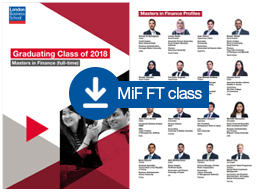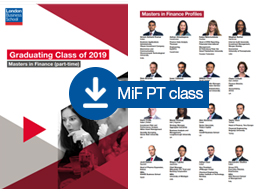by Peter Johnson, Senior Recruitment and Admissions Manager, MiF
The application process for the Masters in Finance (MiF) at London Business School is designed to find highly talented, intelligent finance professionals who will benefit from the learning experience and who will contribute to the vibrant community at LBS both inside and outside the classroom.
But that’s not all. My colleagues and I in the MiF Admissions and Recruitment team and my fellow members of the Admissions Committee are aiming to create a diverse class as we believe this maximises the student experience.
Nationality
Diversity has several aspects. We are looking to recruit a range of nationalities – in the August 2017 Full-time intake we have 36 nationalities and 27 in the Part-time class. This diversity adds great richness to classroom and study group discussions – how business is done is very much influenced by cultural factors, as well as by the different regulatory regimes worldwide. LBS prides itself on being perhaps the most diverse School internationally – this is very apparent in all the social activities on Campus!
I am often asked if we have quotas for each nationality and the easy answer is no, but we try to avoid any one nationality forming more than 10% of the class. At some of our competitor programmes one nationality may form more than 50% of the cohort; we believe this is detrimental to the overall learning experience. A small exception for us is for the Part-time MiF where UK students normally make up around 15% of the class – but this still means 85% originate from outside the UK, a reflection of London’s status as a top global financial centre.
Above all, we expect our students to have a global outlook – and to be fascinated by finance as the pre-eminent global profession with all the challenges and opportunities this entails.
Gender
We are also looking for a strong representation of women in the class and have scholarships and activities in place to support this. While the proportion of women falls below what we would like to see, it’s increasing over time reflecting the greater number of women joining the finance profession. We see the MiF as an enabler for many more women to reach top positions in finance in the future.
Finance Experience
One of the major differentiators of post-experience programmes like our MiF from the majority of finance masters, which are geared towards new graduates making their entry into finance, is the collaborative and interactive nature of the classroom experience. Don’t expect lectures where the professor reveals the abstract theory while you feverishly take notes. On the MiF you will have prepared in advance for the class so you will already have worked through the underlying theory – the classroom applies this in practice, so it is vital that we have people from a wide range of finance backgrounds and markets. This is one of the reasons our finance faculty enjoy teaching the MiF so much – they are engaging with students who have real world experience of the areas they are researching so it’s a two-way dialogue.
As with nationality, we have no set quotas for areas of finance – fortunately the range of people applying naturally ensures that we always have a good cross-section in the classroom. Some of the areas will be obvious – investment banking, corporate finance, asset management, hedge funds, venture capital, private equity, brokerage, private wealth management, family offices, regulators, central banks and finance ministries, auditors and increasingly people from FinTech. We also have an increasing number of students from the finance functions in corporates who are on track to become CFOs. Some roles are less obvious but nevertheless add great richness to the mix – lawyers working on financial transactions, finance journalists and management consultants advising in the finance sector for example. Recently we have admitted a few more senior executives (people with 15+ years of high level experience) to the Part-time MiF who are looking to round out their finance skill set. The more junior people in the class have benefited greatly from their experience – and the more experienced students tell me how much they enjoy the opportunity to mentor the upcoming generation of finance leaders.
Above all you need to have a passion for finance and the commitment and motivation to succeed on the programme and in your career.
If you’re not sure if your experience is a good fit for the MiF why not submit your CV for review. You can also look at the detailed profiles of our current classes by downloading the relevant brochure:
For a great example of one alumna’s MiF journey (from tax advisory at Network Rail to Corporate Strategy and Business Development at The Walt Disney Company) take a look at our MiF alumna Pippa Johnson.



